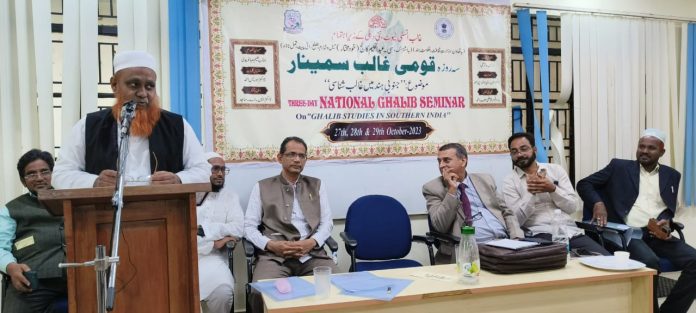– Anwarulhaq Baig
New Delhi, October 29: A national seminar on the world-renowned Urdu poet Mirza Ghalib concluded in Tamil Nadu today, with a focus on strengthening Ghalib’s relationship with South India.
A 3-day national seminar titled “Ghalib Studies in Southern India” was organized by the Ghalib Institute, New Delhi, in collaboration with C. Abdul Hakeem College in Melvisharam, Tamil Nadu. The seminar was inaugurated by Ms. S. Valarmathi, the District Collector of Ranipet, at the C. Abdul Hakeem College auditorium in Melvisharam on Friday.
In her inaugural address, the district collector lauded Urdu as a language with a rich culture that immediately impresses with its sense of belonging and respect for all.
She said, “Anyone who knows anything about this sweet language cannot be unaware of Ghalib’s name.”
She expressed hope that the age-old tradition of Ghalib’s understanding in South India would be systematically presented through the seminar.
Delivering his keynote address at the inaugural session, Professor Qazi Habib Ahmad, former Head of the Department of Arabic, Persian, and Urdu at Madras University, said that while Ghalib’s connection with South India was established during his lifetime and continues today, there was a need to further strengthen it. He congratulated office bearers of the Ghalib Institute and C. Abdul Hakeem College for organizing such a worthy seminar in Tamil Nadu.
In his welcome address, the director of the Ghalib Institute, Dr. Idris Ahmad, informed that the institute organizes two national seminars on Ghalib outside Delhi every year.
“We felt that Tamil Nadu, which is such an important region, had not yet hosted a national seminar on Ghalib. Therefore, they are fulfilling a necessary obligation today by organizing this seminar,” he added.
On the second day of the seminar, prominent writers from all over the country presented papers on the topic. Professor Ataullah Khan, Head of the Department of Urdu at Sanskrit University, presided over the first session of the second day and said that Ghalib’s art should be seen separately from his weaknesses.
In this session, Professor Shams-ul-Huda Daryabadi presented a paper on “Ghalib and Deccan”, Mr. Mohammed Muniruddin Omari presented a paper on “South India’s Ghalib, Allama Shaakir Naiti” and Dr. Nashat Ahmed presented a paper on “Ghalib and Hyderabad”, and Dr. Sheikh Farooq Pasha presented a paper under the title of “The traces of Ghalib understanding in the writings of Rouf Khair.”
The second session of the second day was chaired by Prof. Shamshul Hoda Daryabadi, Head of the Department of Urdu at Maulana Azad National Urdu University, Hyderabad.
During his presidential address, Prof. Daryabadi emphasized that Ghalib had been analyzed through the lens of various sciences and theories, leading to a significant contribution to literature. He noted that contemporary readers no longer traditionally approach literary works but seek to comprehend the context of the text.
In this session, Dr. Amanullah M.B. presented a paper on “Understating of Ghalib among the Tamils, in the context of the Tamil translation of Ghalib’s poetry”, Dr. M Ameenullah presented a paper on “Ghalib in Deccan,” Dr. Manzoor Ahmed Dakkani presented a paper on the Wahab Qaiser’s book ‘Ghalib and science’, Professor Mohammed Nisar Ahmed presented a paper on “Ghalib and Zaka”, Dr. Sajid Hussain presented a paper on “The tradition of Ghalib’s understanding in South India”, and Professor Attaullah Khan presented a paper on “Ghalib and Zaka”.
The third session was chaired by Professor Khasim Ali Khan, former Head of the Department of Urdu at Dr. Ambedkar Open University in Hyderabad. In his address, he highlighted Telugu as one of the languages where extensive work has been undertaken on Ghalib. Numerous translations of Ghalib’s poetry into Telugu have been produced, along with several books. He informed the participants that there was a well-established tradition of Ghazal or ode in Telugu, where Ghazals were both recited and sung.
In this session, Dr. Syed Vasiullah Bakhtiary presented a paper on “Understanding Ghalib in South India,” Mr. Zaheer Danish Omari presented a paper on “Deccan and the Commentaries of Divan Ghalib,” Dr. Basheera Sultana presented a paper on “Understanding Ghalib in South India,” Dr. Abu Bakar Ibrahim Omari presented a paper on “Allama Shakir Naiti and Ghalib,” Mr. Mohammed Saifi Omari presented a paper on “Available Special Issues of Newspapers and Magazines on Ghalib in South India,” and Mr. Sattar Faizi presented a paper on “Understanding Ghalib in Telugu.”
The fourth and final session was chaired by Professor Mohammed Ameenullah. In his presidential address, he praised the papers presented during this session, emphasizing their rarity and the scarcity of available material on these topics.
In this session, Dr. Dawood Mohsin, Mr. Kaleemullah, Dr. Saeeduddin, Dr. Noorullah, and Mr. Sardar Sahil presented their papers on various aspects of Ghalib’s poetry.
After the seminar, an all-India poetry recitation event, “mushaira” was organized, with Mr. Anis Ahmed presiding over it and Mr. Shafiq Abidi conducting it. The participating poets included Abrar Kashif, Akbar Zahid, Maulana Shakir Ahsan, Latifuddin Latif, Sahid Madrasi, Mahir Madrasi, Vasiullah Bakhiary, Siraj Zebai, Waheed Pasha Qadri, and Anwar Hadi, who presented their poems.
While proposing the vote of thanks, the convener of the seminar and principal of the college, Dr. S. A. Sajid, reminded participants of the vision of the founder of the college, the late C. Abdul Hakeem, who believed that the Indian nation should be at the forefront in the field of education. He has also mentioned that South India has produced not only great scientists, engineers, and businessmen, but also great writers, critics, and researchers.




